Solution 1: setOnScrollListener
Save your X-Position as class variable and update each change within the onScrollListener. Ensure you don't reset overallXScroll (f.e. onScreenRotationChange)
private int overallXScroll = 0;
//...
mRecyclerView.setOnScrollListener(new RecyclerView.OnScrollListener() {
@Override
public void onScrolled(RecyclerView recyclerView, int dx, int dy) {
super.onScrolled(recyclerView, dx, dy);
overallXScroll = overallXScroll + dx;
Log.i("check","overall X = " + overallXScroll);
}
});
Solution 2: Calculate current position.
In my case, I have a horizontal List which is filled with time values (0:00, 0:30, 1:00, 1:30 ... 23:00, 23:30). I'm calculating the time from the time-item, which is in the middle of the screen (calculation point). That's why I need the exact X-Scroll Position of my RecycleView
- Each time item has the same width of 60dp (fyi: 60dp = 30min, 2dp = 1min)
First item (Header item) has an extra padding, to set 0min to the center
private int mScreenWidth = 0;
private int mHeaderItemWidth = 0;
private int mCellWidth = 0;
@Override
protected void onCreate(Bundle savedInstanceState) {
super.onCreate(savedInstanceState);
//init recycle views
//...
LinearLayoutManager mLLM = (LinearLayoutManager) getLayoutManager();
DisplayMetrics displaymetrics = new DisplayMetrics();
this.getWindowManager().getDefaultDisplay().getMetrics(displaymetrics);
this.mScreenWidth = displaymetrics.widthPixels;
//calculate value on current device
mCellWidth = (int) TypedValue.applyDimension(TypedValue.COMPLEX_UNIT_DIP, 60, getResources()
.getDisplayMetrics());
//get offset of list to the right (gap to the left of the screen from the left side of first item)
final int mOffset = (this.mScreenWidth / 2) - (mCellWidth / 2);
//HeaderItem width (blue rectangle in graphic)
mHeaderItemWidth = mOffset + mCellWidth;
mRecyclerView.setOnScrollListener(new RecyclerView.OnScrollListener() {
@Override
public void onScrolled(RecyclerView recyclerView, int dx, int dy) {
super.onScrolled(recyclerView, dx, dy);
//get first visible item
View firstVisibleItem = mLLM.findViewByPosition(mLLM.findFirstVisibleItemPosition());
int leftScrollXCalculated = 0;
if (firstItemPosition == 0){
//if first item, get width of headerview (getLeft() < 0, that's why I Use Math.abs())
leftScrollXCalculated = Math.abs(firstVisibleItem.getLeft());
}
else{
//X-Position = Gap to the right + Number of cells * width - cell offset of current first visible item
//(mHeaderItemWidth includes already width of one cell, that's why I have to subtract it again)
leftScrollXCalculated = (mHeaderItemWidth - mCellWidth) + firstItemPosition * mCellWidth + firstVisibleItem.getLeft();
}
Log.i("asdf","calculated X to left = " + leftScrollXCalculated);
}
});
}
